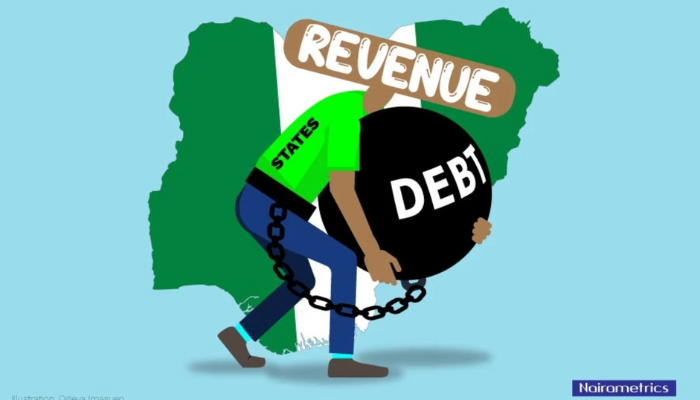Nigeria’s public debt has surged by ₦57.3 trillion over the past 18 months, escalating from ₦87.38 trillion in June 2023 to ₦144.67 trillion by December 2024. This represents a 65.6% increase, as reported by the Debt Management Office (DMO).
Breakdown of Debt Accumulation
Federal Government Debt:
- Domestic Debt: The Federal Government’s domestic debt rose from ₦48.31 trillion in June 2023 to ₦70.41 trillion by December 2024, marking a 45.7% increase. This growth was significantly influenced by the securitization of ₦22.7 trillion in Ways and Means Advances from the Central Bank of Nigeria.
- External Debt: External debt increased from ₦29.9 trillion to ₦62.92 trillion within the same period, largely due to new borrowings and the depreciation of the naira.
Overall, the Federal Government’s total debt portfolio expanded from ₦78.21 trillion to ₦133.33 trillion, accounting for over 90% of the nation’s total debt.

State and FCT Debt:
- External Debt: Combined external debt for states and the Federal Capital Territory (FCT) rose from ₦3.35 trillion to ₦7.37 trillion.
- Domestic Debt: Domestic borrowings by state governments and the FCT declined from ₦5.82 trillion to ₦3.97 trillion, possibly due to limited borrowing access amid rising debt costs.
Debt Composition and Instruments
The composition of Nigeria’s debt has shifted towards external borrowings, with foreign debt accounting for nearly 49% by December 2024, up from 38% in June 2023.
Domestic Debt Instruments:
- FGN Bonds: Increased from ₦41.97 trillion to ₦55.44 trillion, including ₦54.03 trillion in naira-denominated bonds and ₦1.41 trillion in domestic dollar bonds.
- Treasury Bills: More than doubled to ₦12.35 trillion, indicating a higher reliance on short-term debt instruments.
- Sukuk Bonds: Rose to ₦992.56 billion
- Savings Bonds: Increased to ₦72.87 billion.
- Promissory Notes: Doubled to ₦1.54 trillion, with ₦425.6 billion in naira and ₦1.12 trillion in dollar-denominated notes owed to local entities.
Implications and Outlook
The substantial increase in public debt underscores the need for prudent fiscal management and effective debt utilization. While borrowing can finance critical infrastructure and development projects, the rising debt levels necessitate transparency and accountability to ensure long-term economic stability.
As Nigeria continues to navigate its fiscal challenges, stakeholders advocate for comprehensive strategies to manage debt sustainably, enhance revenue generation, and foster economic growth.
Support InfoStride News' Credible Journalism: Only credible journalism can guarantee a fair, accountable and transparent society, including democracy and government. It involves a lot of efforts and money. We need your support. Click here to Donate
